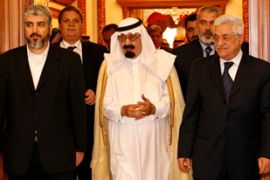Hamas ‘will never recognise Israel’
Israeli officials say Palestinian unity deal clouds prospects of three-way summit.

For their part, Israeli officials said the unity deal cast doubt on the prospects of a three-way summit scheduled for February 19 between Mahmoud Abbas, the Palestinian president; Ehud Olmert, the Israeli prime minister; and Condoleezza Rice, the US secretary of state.
Tzachi Hanegbi, who heads the foreign affairs committee of the Israeli parliament, told Israel Radio: “Abu Mazen failed completely and he awarded a significant victory to Hamas.
“As a result, the chance of advancing an effective initiative and an agreement between Israel and the Palestinians has receded.”
Western reactions
The EU is to study whether the new government, which could take several weeks to form, respects principles set by the Quartet for relations and financial aid to be restarted, which were halted after Hamas came to power in March 2006.
| Your Views |
|
“If these two factions unite, will they leave Israel alone and get on with furthering the fortunes of their own people?”
Bainatluc, Kitchener, Canada
|
Those principles include the renunciation of violence, the recognition of Israel and respect for past Israeli-Palestinian agreements.
A spokeswoman for Javier Solana, the EU foreign policy chief, said: “We are going to look at all the details with the best will in a positive but cautious manner.”
The deal between Hamas and Fatah to form a Palestinian unity government may not satisfy the US or Israel but opens the door for Arab and some European states to ease the crippling economic blockade.
Political deadlock
The Arab League has hailed the Mecca accord, hoping it would end the political crisis in the territories.
In a statement, Amr Moussa, the league’s secretary-general, expressed “hope and trust that the agreement would end the political deadlock … allowing Palestinians to focus on their primary cause which is the formation of a Palestinian state with Jerusalem as its capital.”
Moussa called on the Middle East diplomatic Quartet – comprising the UN, the European Union, the US and Russia – to take note of “this important step” and of the need to lift the financial boycott of the Palestinians.
Factional fighting
Sufian Abu Zaida, a senior Fatah official, said the goal of the unity government deal was to end the factional fighting that has raged for months between the factions, rather than meet the three conditions set out by the Quartet for ending the economic blockade.
“They did not think of Condoleezza Rice, [US president George] Bush, Israel, the Americans, the Quartet. … Mainly they considered how to avoid bloodshed,” he told Israel Radio.
Hani Habib, a Palestinian political analyst, said an agreement was reached on a unity government because neither side was strong enough to win militarily.
The US has pledged $86m to strengthen Abbas’s forces; Hamas receives support for Iran and other Islamist allies.
While an injection of Saudi funds would help the Palestinian economy rebound, without US and Israeli support the Palestinian government’s financial woes are unlikely to end any time soon, diplomats monitoring the financial embargo said.
Diplomats said it is also unclear whether international and regional banks will resume transferring funds to the Palestinian government without Washington‘s explicit approval.